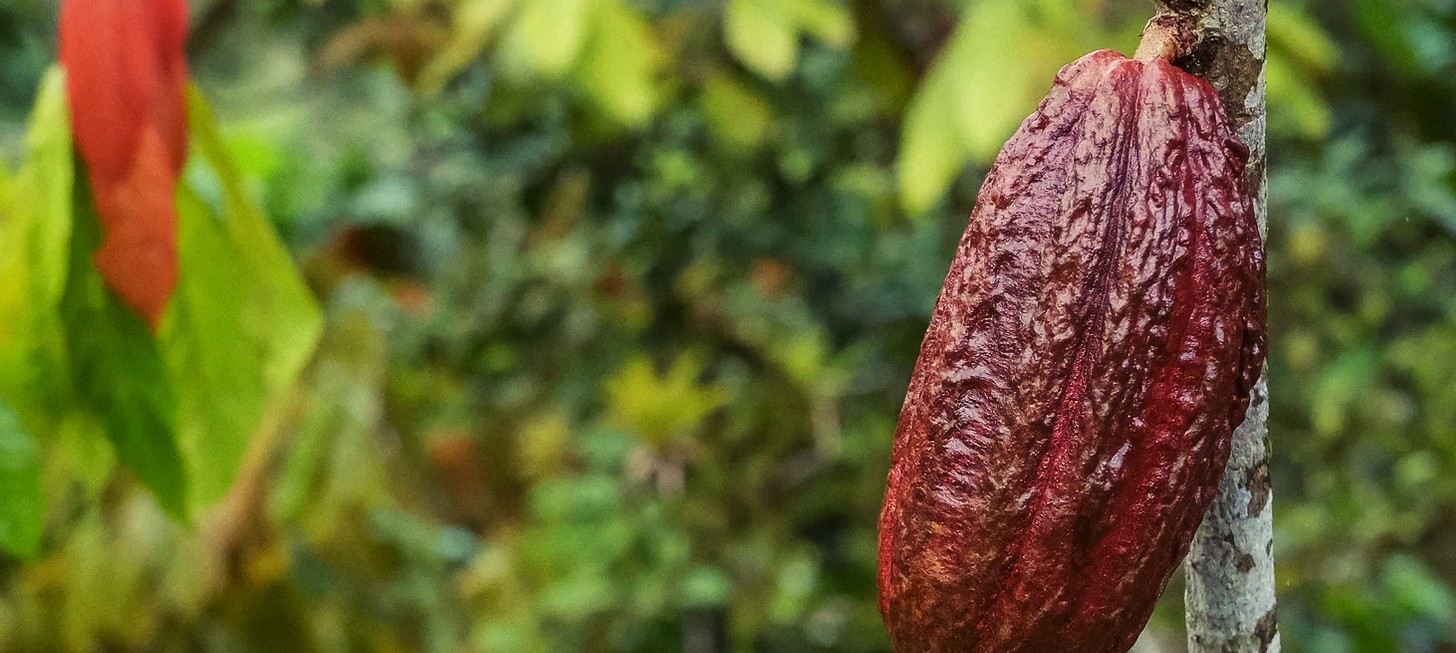
Over the past few months, articles on cocoa have been frequent in the international media, mainly from the point of view of the impacts of bad weather and volatile prices on mega chocolate producers. In fact, an article, Retail chocolate prices expected to surge in 2025, published in Food Business News on 23 September 2024 suggested that the ‘global cocoa meltdown of 2024 may have peaked with futures prices in April, but chocolate lovers are just beginning to experience its worsening effects’. Much of this global meltdown was blamed on ‘poor harvest in West Africa, which provides almost 70% of global supply’. Poor harvests were in turn, blamed on ‘adverse weather conditions, aging trees, pests, diseases and gold mining that took land from cocoa farms.’
Several other articles on the dynamics in the global cocoa market can be found – almost all from the supply side referring to African country producers. Virtually all are concerned with volatile prices, instability in outputs and quality of cocoa beans and their negative impact on production and prices of cocoa’s main high-value product – chocolate. It is to be noted that supply-side issues relating to cocoa beans, speak to very traditional aspects of cocoa farming in these West African states. On the other side of the supply coin – the value added, the news is much more first-world and high-tech.
The Independent online news posted an article on 2 September 2024, titled ‘The Scientists making cocoa in a laboratory to meet world’s demand for chocolate’. This unprecedented and potentially transformative agritechnology from California Cultured, a plant cell culture company is driven by the need to ‘buffer chocolate’s key ingredient from climate change’. The risk was measured in terms of the impact on ‘chocolate’ and not so much on livelihoods to cocoa farmers in developing countries. Add to this the recent news from Graphic Online, published on 27 August 2024 that ‘the whole of the cocoa fruit can now be used to make chocolate and reduce sugar’. Note that potential chocolate breakthrough innovation is being driven by Swiss scientists.
|
“On the other side of the supply coin – the value added, the news is much more first-world and high-tech… Should this be a wake-up call for traditional cocoa producers in West Africa and the Caribbean? And if so, how are we being called to respond?” |
While these global cocoa market dynamics were unfolding, the Original Trinitario Cocoa Education Foundation (OTC) in Trinidad and Tobago hosted an online forum on 5 June 2024 titled ‘Cocoa on the Rise'. This session brought together more than 150 stakeholders from various regions, including the Caribbean, Latin and North America, Europe, and beyond, in the cocoa community, to share their knowledge, experiences and discuss matters relating to the continued development of an industry dominated by micro to small operators, from a base of cocoa estates steeped in history.
This was a different global cocoa stakeholder gathering, transcending geographical boundaries, producer size and scale, product innovation and diversity. Even as Caribbean cocoa exports have declined significantly, the internationally renowned fine flavor cocoa brand is still strong and sought. The stakeholders on the forum shared one common goal, a collective commitment to the sustainable development of the Caribbean cocoa industry within the uncertainty of the dominant global cocoa dynamics.
An important feature of the forum was the presentation of the findings of the three-year OTC cluster projects, co-funded by the Compete Caribbean Partnership Facility. The presentations covered a spectrum of crucial topics, from organic certification and permaculture practices to cutting-edge research on bio-stimulants and digital storytelling in cocoa marketing. Each session contributed to a deeper understanding of the challenges and opportunities facing the cocoa sector, while also highlighting practical solutions and advancements. The importance of a product’s ‘story’ embedded into strategies for both marketing and mobilization of industry support, through presentations by Denise Speck of Digital Storytelling, illustrated how digital narratives can enhance the visibility and marketability of Trinidad and Tobago's cocoa industry.
For the OTC, having such a forum ‘highlighted the immense potential and exciting future of the Trinitario cocoa industry, and the potential, through greater collaboration, to drive tangible impacts in Trinidad and Tobago's cocoa industry and beyond, including the thrust towards organic cocoa production and certification’. Among the most fundamental areas in collaboration for impact include achieving a significant ‘rise’ in productivity in tree health and bean quality. This, as the impacts of the climate crisis and market volatility are already adversely impacting cocoa estates in the twin-island state, creating difficult livelihood challenges for cocoa farmers.
|
“Among the most fundamental areas in collaboration for impact include achieving a significant ‘rise’ in productivity in tree health and bean quality” |
Even as a range of speakers shared their perspectives and experiences across the cocoa value chain, there was an emerging consensus of the need to ‘look at cocoa from an inclusive perspective, understanding that what's in the soil affects the quality and flavor of the end product’, and hence, as Sarah Bharath (Soil and Cocoa Scientist) emphasized, the need for ‘education in sustainability-based practices and improving cocoa quality’. Indeed, as illustrated from tangible experiences with Wa Samaki Ecosystems, Erle Rahaman-Noronha, permaculture practitioner, urged the integration of permaculture principles in cocoa farming to promote ecological balance and sustainability using effecting planning tools and few external inputs.
It is well known that cocoa trees perform best in an agroecological environment, and hence the traditional plantation style monoculture farming system may no longer be appropriate in this new era of climate change. This is aligned to the IICA Director General, Dr. Manuel Otero’s statement that ‘the new frontier of science, technology and innovation offers opportunities for transforming agri-food systems and for producing in impossible environments" at the preparatory meeting of the G20 Social in July 2024. The idea of farming in impossible environments ideally sums up the situation driving concerns in the global cocoa supply chain and the aggressiveness of innovation to buffer impacts of climate change on cocoa bean output.
|
“The cocoa tree needs an intervention; it needs a boost to help it adapt to the harsher realities of the growing conditions” |
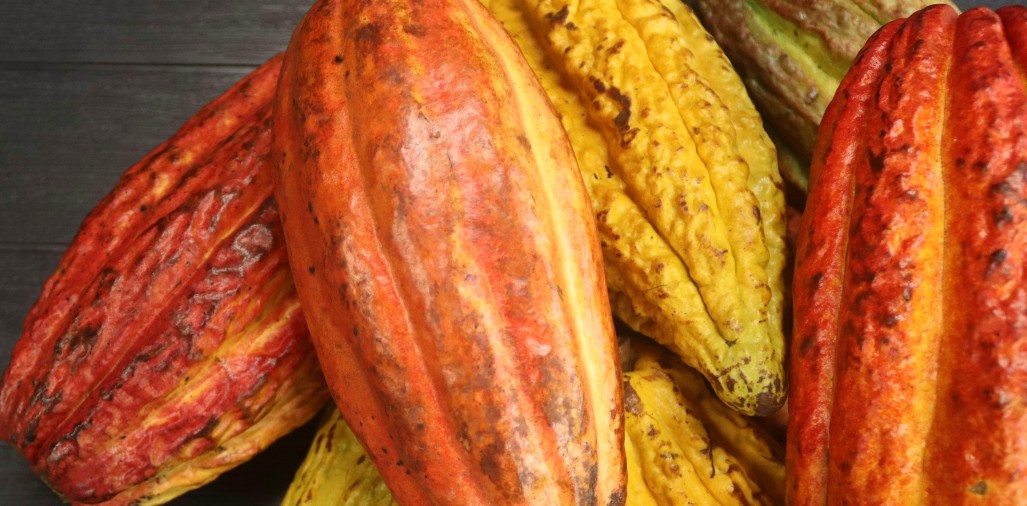
Photo by Sara Gomes, Unsplash.
This is where research into grafting and propagation and use of bio stimulants to boost plant growth are adding value to the Caribbean’s cocoa industry comeback. At the forum, a practice as old as time, grafting, was innovated by Junior Bhola, graft and propagation expert. The Bhola method, an early-stage plant propagation technique developed specifically for cocoa grafting, was featured as the Forum as a practical solution to enhance the productivity and success rates of nurseries and tree productivity. Complementary to the Bhola grafting technique was the research on the effectiveness of bio-stimulants in cocoa agriculture. Dr. Caleb Lewis, Scientist and Researcher, shed light on how these substances can boost plant growth at an early stage in the plant lifecycle, before installation in the fields. These early-stage interventions were seen as critical to sustainability-driven productivity-based cocoa farming recovery.
Towards a sustainable cocoa sector
It is also to be noted that a sustainability-driven agenda for cocoa production must also consider issues of the industry’s carbon footprint and consumer safety and health. In this area, the work being done by OTC and IICA find synergies as they both are grounded in soil care and proper tree maintenance. In discussing the concept of a zero-carbon cocoa storage facility, Shawn Sajad, OTC’s Outreach Coordinator, highlighted its potential to reduce the carbon footprint of cocoa storage, improve environmental sustainability and provide storage to rural communities which are not on the electrical grid. This is essential to sustain decent livelihoods for cocoa farmers in rural areas.
The results of an EU funded IICA and the UWI Cocoa Research Centre project on cadmium in cocoa was also very timely to the industry development conversation. As indicated by Richard Rampersaud, Technical Specialist in IICA Trinidad and Tobago, among the main contributions of this project has been mapping of cocoa hot spots, training of Master Trainers, and development of training materials to mitigate the residual levels of cadmium in cocoa beans. This is a major issue in international cocoa marketing and a significant concern for cocoa producers and consumers alike. It has the potential to negatively impact cocoa exports if the maximum residue levels of cadmium fall above a set threshold in EU markets. This is also inextricably linked to traceability, as emphasized by Salla Mankinen, Founder of Orijin, in his demonstration on Orijin's digital traceability solutions, and how technology can ensure transparency and traceability in the cocoa supply chain.
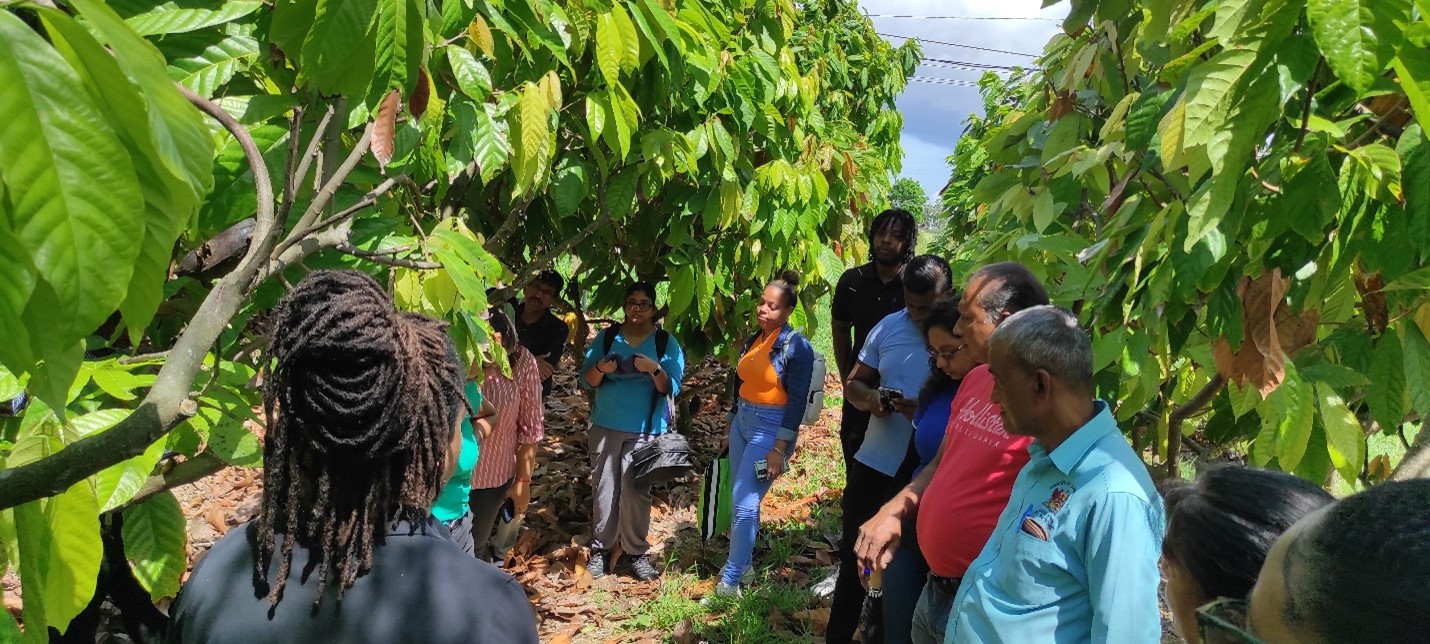
Trinidad & Tobago Extension officers on their Master Trainers in Cocoa Cadmium management field session facilitated by CRC experts (Photo by IICA Delegation in Trinidad and Tobago).
Acting on the key takeaways is critical, particularly enabling adoption of sustainable farming techniques, integration of innovative technologies for traceability and quality assurance, and education and training in empowering cocoa farmers and post-harvest processors. Ensuring that Caribbean cocoa production stabilizes and grows sustainably within global dynamics must be built on collaboration within the industry and between the industry and other key players to ensure "Cocoa on the Rise" becomes more than just a tagline; that it represents a collective vision and commitment to a thriving, sustainable cocoa sector that benefits farmers, consumers, and the environment alike.
About The Original Trinitario Cocoa Education Foundation (OTC)
The Original Trinitario Cocoa Education Foundation (OTC) empowers individuals and communities in the cocoa industry through membership benefits and specialized advisory services. By joining us, you’ll gain access to invaluable resources, expert insights, and a network of passionate individuals dedicated to advancing cocoa cultivation and entrepreneurship. Our "Sustainable Cocoa Farming Workshop Series" offers free webinars and in-person opportunities to enhance your knowledge and skills. If you're interested in our consulting services, our team of specialized cocoa professionals is ready to assist you in areas such as Farmer Engagement, Post-Harvest Optimization, Sustainable Practices, and more. Follow us on Instagram (@otc_foundation) and sign up for our newsletter at www.otctt.org to stay updated on new insights and opportunities. For more information, feel free to contact us at otcfoundationtt@gmail.com.
Join us in making a meaningful impact in the cocoa industry!
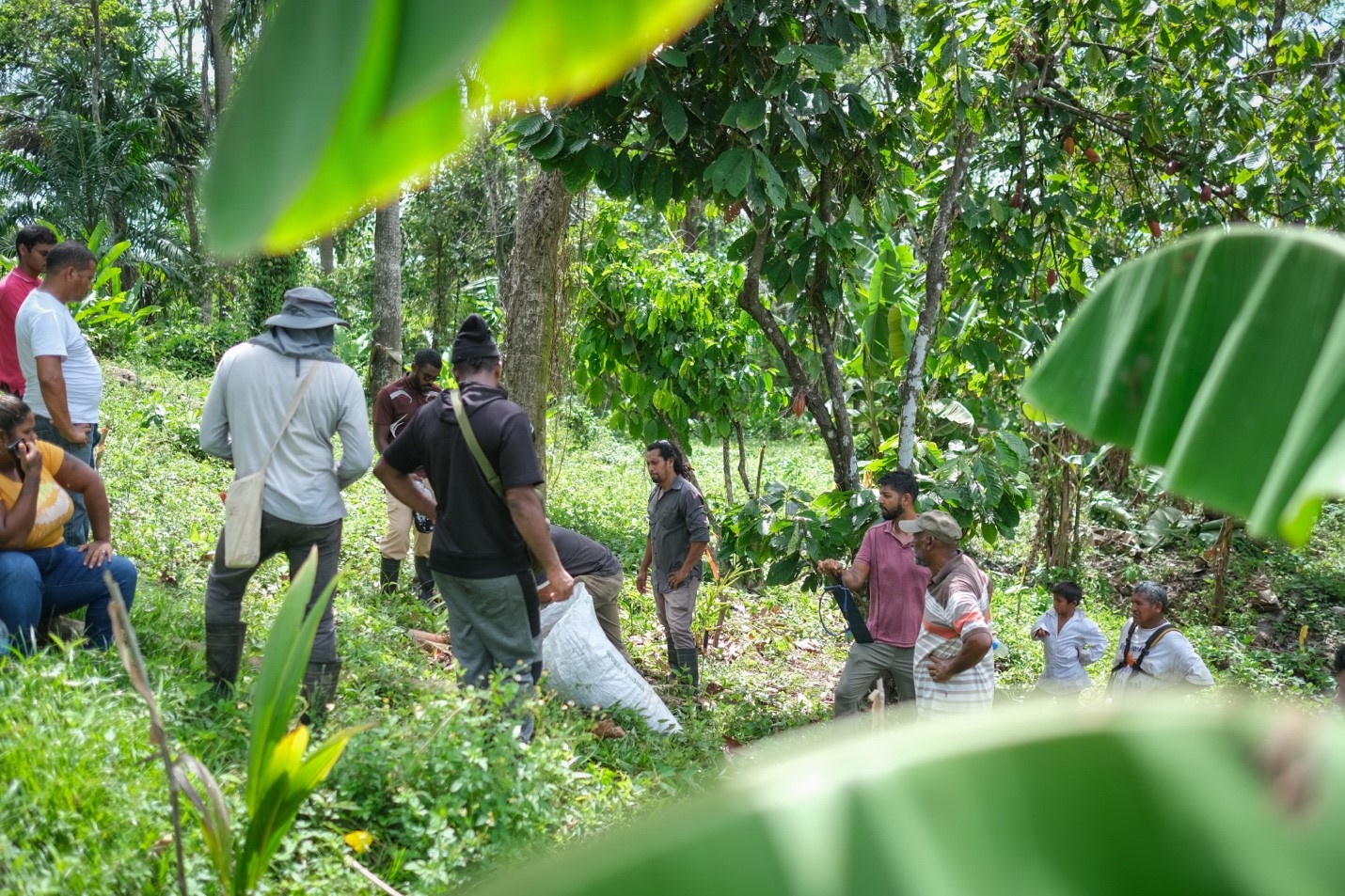
OTC members participating in a practical training session in Trinidad & Tobago (OTC).
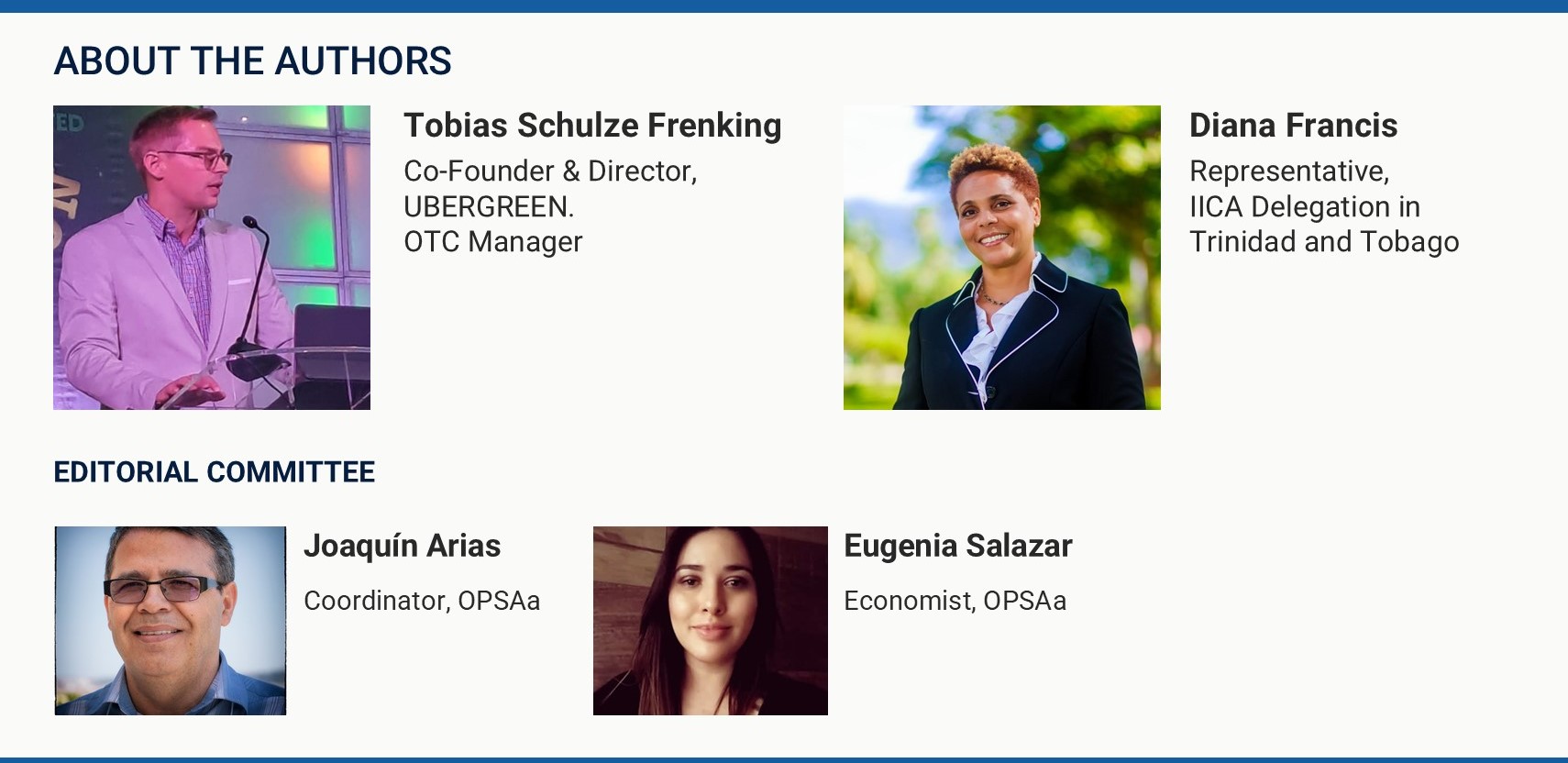
*The opinions expressed in this blog are those of the authors. They do not purport to reflect the opinions or views of the IICA or its members.
Añadir nuevo comentario